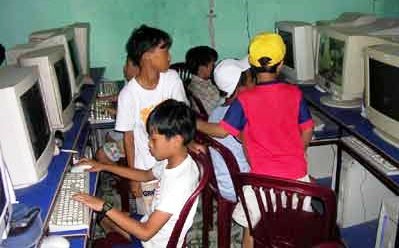Banning Minors Inside I-Cafés During School Hours
 The City of Manila has recently passed an ordinance that prohibits, among other things, the entry of elementary and high school students to i-cafés during school hours. I do not know the details of Manila City Ordinance No. 8168 and the only news I found in the Internet is this one entitled Bagets bawal na sa internet. I presume that such prohibition is intended to curb truancy among students of minor age who play games at i-cafés instead of attending their classes.
The City of Manila has recently passed an ordinance that prohibits, among other things, the entry of elementary and high school students to i-cafés during school hours. I do not know the details of Manila City Ordinance No. 8168 and the only news I found in the Internet is this one entitled Bagets bawal na sa internet. I presume that such prohibition is intended to curb truancy among students of minor age who play games at i-cafés instead of attending their classes.
The news says that the elementary and high school students in the City of Manila would not be allowed to enter i-cafés during school hours, Monday to Friday. They will be allowed to do so on Saturdays and Sundays. According to the same news article, curfew hours for minors starting at 10:00 PM will also be enforced. The news did not say if there are hours during Mondays to Fridays that elementary and high school students will be allowed to enter i-cafés.
Assuming that students of minor age will be totally banned from entering i-cafés Mondays to Fridays, is this the best for the situation? How about the students who would like to do their assignments/homework using the Internet but they do not have computers in their homes or doesn’t know about how to acquire the Case study assignment help? Should they also be banned from entering i-cafés from Monday to Friday?
Personally, I do not subscribe to totally banning minors inside i-cafés during school hours in in solving truancy problem. Classifying computer shops into gaming i-cafés and non-gaming ones then making sure that no students would enter the i-cafés offering games during school hours should be a better option. This way, students who would do their assignments/homework using the Internet would not be hampered. The authorities must make sure though that the i-cafés in which the students would be allowed to do their studies are not offering games in their services.




another stupid ordinance. as if minors have the same schedule all the time. in a high school near here, classes are held from 6am – 8pm! the school just don’t have enough resources to keep them all in one schedule. so they have to be broken down in shifts. i doubt if manila is any different. what’s the window of opportunity for the student to go to a lanshop then?
why not require schools to print the student’s schedule at the back of their “laminated” ids? that way, lanshop owners can check their schedule if they are supposed to be in school or not. a telephone number can also be included so the owner can verify if a class is cancelled or not.
sometimes i wonder if an education is required to be in government these days. it’s not like it’s rocket science. it’s simple common sense, if they bother to think about it.
you know that it is the school opening already since it is a time for the politicians to take puck shots at internet cafes as the source of the problem of truancy. just saw the report on 24 oras and how vice mayor isko moreno went around manila to see if there is a compliance to this ordinance.
isn’t it weird that he is concerned about the children and yet under his watch they were able to pass the ordinance allowing the pandacan oil depo to remain despite the fact that a lot more people could get killed if an accident or a terrorist attack should happen there. this is what we call selective morality wherein each action is based on certain conditions and not on the action of the whole.
during my stay in davao, i was lucky enough to take part in a brigada eskwela program in which we painted the wall of a public school building. when i looked inside the classroom, i was amazed that it still looked the same like the way when i was in the elementary levels in the 1970’s. to think of it nothing has really changed in terms of the manner of education here in the Philippines. while our neighboring country has already incorporated computers in their day to day classes, our teachers here still does their lessons using the blackboard, chalks and manila papers.
denial of access to technology must be considered as the curtailment of the basic human right of an individual and such law is oppressive in a way since it takes the opportunity away from the person to make his own decision.